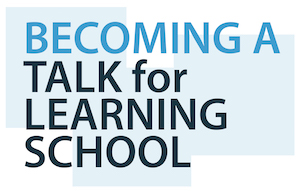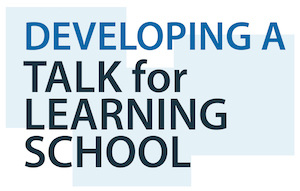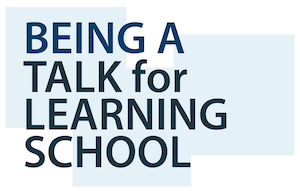Talk for Learning School Quality Awards
A tool for school improvement

Becoming a Talk for Learning school - initial training course and follow up
• The school ethos promotes active listening with children and staff.
• There should be a reference to Talk for Learning within the Teaching and Learning policy.
• The school improvement plan clearly shows Talk for Learning as a school improvement tool.
• The budget shows that time and money has been spent on introducing Talk for Learning in the school.
• All teaching staff and the leadership team, know and understand Talk for Learning methods.
• All new staff have an induction to Talk for Learning methods.
• Children are all trained in paired talk using echo, pause and rewind, knee to knee and shoulder to shoulder positions.
• All teachers are introducing Talk for Learning structures in their classroom.
• Planning shows some Talk for Learning activities are in place in lessons across a range of curriculum areas.
• There is improvement in the pupil’s engagement and Talk for Learning skills of children from baseline measures.
• Governors know and understand Talk for Learning as a methodology for improving the quality of teaching.

Developing a Talk for Learning school – ongoing consultancy support
• The school ethos promotes Talk for Learning strategies in staff meeting for the teaching and support staff.
• The teaching and learning policy should be based on Talk for Learning methodology.
• The school improvement plan clearly shows Talk for Learning as a key school improvement tool.
• The budget shows that time and money has been spent on developing Talk for Learning in the school.
• All new staff have access to quality training during their first year.
• Talk for learning is evident in every core subject lesson plan.
• Support staff are actively involved in Talk for Learning in the classroom.
• There is continued improvement of pupil engagement and talk for learning skills from previous measure.
• Hard to reach and pupil premium children are more engaged in whole class teaching.
• Children’s books reflect the Talk for Learning activities that are in most lessons.
• Governors are able to see Talk for Learning when monitoring school improvement.
• Pupil progress in core subjects is improved for most pupils.

Being a Talk for Learning school – reduced consultancy support
• The school ethos promotes Talk for Learning strategies at all meetings.
• The curriculum and other policies should reflect Talk for Learning methodology.
• The school improvement plan clearly shows the Talk for Learning as the main school improvement tool.
• The budget shows that time and money has been spent on continuing Talk for Learning in the school for the long term.
• All teaching staff have had training in planning talk for learning journeys.
• All new staff have access to quality training on arrival.
• Curriculum planning shows talk for learning journeys across all areas of the curriculum.
• Talk for learning is evident in learning walks, observations, planning, pupil interviews and looking at outcomes through books and pupil progress meetings.
• Children create opportunities for Talk for Learning in class and beyond.
• Support staff use Talk for Learning methods when working independently with groups.
• There is consistently high quality of Talk for Learning in all classrooms and lessons.
• Subject leader’s in-house training and monitoring should reflect the Talk for Learning methodology.
• Governor meetings are carried out using Talk for Learning methodologies,
• Behaviour for learning improves and incidents of poor behaviour are reduced.
• Hard to reach children have more positive attitudes to school, improved attendance, are more punctual and have more involvement in out of school hours activities.
• Pupil progress is improved for the vast majority of pupils.